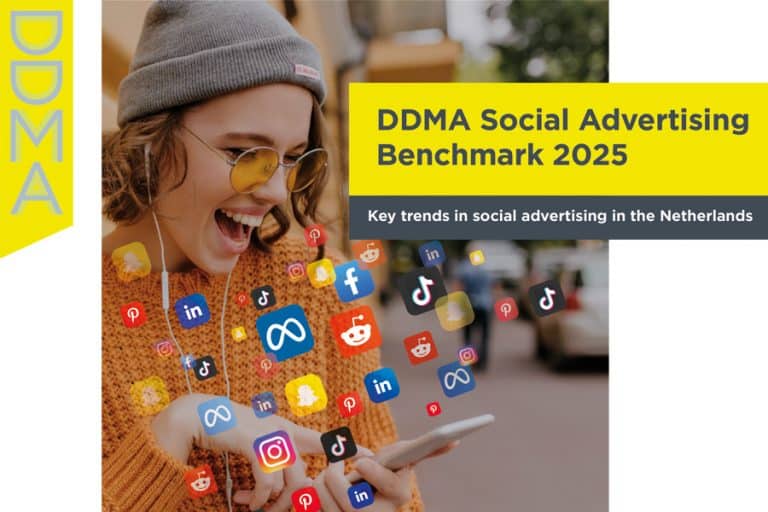DDMA Privacy Monitor 2023 (ENG)
Download (2,86 MB)Download the Dutch version of the DDMA Privacy Monitor here.
Diana Janssen (Director General at DDMA): “I am very pleased with this study, which will also be the last research to be published under my leadership at DDMA. This topic lies at the foundation of data-driven marketing. Through this research – and the previous DDMA Privacy Monitors that we have published since 2016 – we have a clear picture of the expertise, attitude and behaviour of Dutch consumers in the realm of online privacy and data-sharing: indispensable knowledge for every marketer, data specialist and lawyer. Due to the addition of qualitative focus groups as a research method, we can offer even more depth on concepts such as privacy, trust, control and transparancy, from a consumer’s perspective, and make recommendations to Dutch organisations about the handling of personal data.”
Practical knowledge knowledge of online privacy is lacking, as is a sense of control
Awareness of General Data Protection Regulation (GDPR) has doubled since its application in May 2018 (from 28% to 66%). Nevertheless, this awareness seems to be more general in nature, not about what it exactly entails. The practical knowledgeof Dutch consumers about online privacy is limited, the subject is not a key one for most people, and calls to mind dubious connotations. In addition, when sharing personal data, people tend to think in particular in terms of the active sharing of data within a form, such as an e-mail address or phone number, and not of the passive sharing of – for example – browsing behavior and location data.
I think it’s a strange notion that an item is sold and something then takes place afterwards behind the scenes. It feels odd, because I haven’t the patience to keep up with it as a personal responsibility. I search for all kinds of things, and then all of a sudden, I start getting adverts as a result. That doesn’t feel right somehow.
consumer comment from qualitative research
Reviewing terms and conditions and privacy policies is viewed by consumers to be unnecessarily complex and time-consuming. In addition, consumers experience a lack of control: 80% of the Dutch indicate that they would like more control over how personal data is used and stored by organisations. People feel that their influence in this regard is limited, resulting in an attitude of resignation and little initiative from a consumer perspective.
Willingness and sense of ease increase with transparent data exchange
Nevertheless, consumers who are pragmatic (42% of the Dutch) and unconcerned (36%) about online privacy and data-sharing make up the majority. The consumer benefits and necessity of data exchange are increasingly acknowledged, and the ease with which data is shared is increasing. This is especially true for data that people consciously share. A feeling of unease and distrust arises if a certain activity is less understood, and transparency on the part of the organisation is lacking; for example when passively sharing data such as browsing behaviour, or data that seems to be less relevant.
Consumer acts out of personal interest in sharing data
‘What’s in it for me?’ is the main criterion for consumers to be willing to share data. The value and relevance of the reward can vary per person and situation. Recent research by the University of Groningen has shown that consumers make predictable considerations about when and why they share data. This also offers an explanation for the (privacy) paradox, where consumers experience concerns when it comes to their online privacy on the one hand, but still share their data. They weigh up the ‘costs’ in comparison with the benefits they can enjoy, such as a financial advantage, or a personalised offer.
Trust, relevance and transparency are essential components
Having confidence in an organisation is the most important condition for sharing personal information with an organisation (for 37% of the Dutch population). The familiarity of an organisation is an important predictor for trust. If an organisation is not yet known to the consumer, then trust is based on (online) recommendations / reviews.
Once trust in an organisation is present, then the relevance of the requested data and transparency from within the organisation are essential prior to consumers being willing to share data.
I’m already on that website anyway and I want to buy something there… in that case, sure, I’ll sign up for a discount. I can always unsubscribe.
consumer comment from qualitative research
Research accountability
The DDMA Privacy Monitor 2023 contains results from 2 surveys. The quantitative survey was conducted by the GDMA (umbrella organization of DDMA) in collaboration with Foresight Factory among 20,626 respondents, including 1,039 Dutch. The qualitative survey was conducted through focus groups in collaboration with CO-efficiënt.
Ook interessant

DDMA Barometer 2025: The Dutch are reducing their digital media use, what does this mean for marketing in 2026?

DDMA Social Advertising Benchmark 2025: conversions are back, platform mix expands


